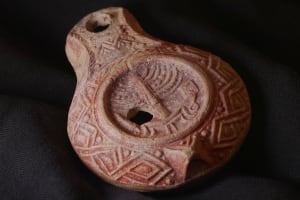Almost 4,400 years old – Archaeologists say oldest alphabet may have been discovered in Syria
Findings date to 500 years before previous evidence of alphabetic writing

Archaeologists may have discovered in a tomb in Syria the oldest alphabetic writing ever found.
The ancient script was found engraved on clay cylinders during excavations of a tomb at Tell Umm el-Marra near Aleppo, Syria in 2004.
The cylinders were found by Dr. Glenn Schwartz, a professor of Archaeology at Johns Hopkins University, who led a research team on the dig, along with colleagues from the University of Amsterdam.
It is generally accepted that alphabetic writing began around 1800 B.C. among Semitic peoples living in Egypt, who adopted portions of the hieroglyphic script to write their own language.
However, Schwartz' discovery could upend that story. Radiocarbon dating shows the cylinders, which were found in Early Bronze Age tombs, date to around 2400–2300 B.C., roughly 500 years before the accepted date.
The cylinders were found next to intact pottery, including jars, and they had perforations in them, which may have allowed them to be placed onto a thread.
“The cylinders were perforated, so I'm imagining a string tethering them to another object to act as a label. Maybe they detail the contents of a vessel, or maybe where the vessel came from, or who it belonged to,” Schwartz said. “Without a means to translate the writing, we can only speculate.”
He said that the development of the alphabetic system of writing ultimately democratized the way people communicated information.
“Alphabets revolutionized writing by making it accessible to people beyond royalty and the socially elite. Alphabetic writing changed the way people lived, how they thought, how they communicated,” he explained.
“And this new discovery shows that people were experimenting with new communication technologies much earlier and in a different location than we had imagined before now.”
However, recognizing that his proposal of the discovery of an alphabetic script at least 500 years earlier was a “game changer,” he first enlisted the aid of scholars who specialize in writing.
He asked his colleague, Alice Mandell, an assistant professor in the same Department of Near Eastern Studies, for her opinion. She is also the William Foxwell Albright chair in Biblical and Ancient Near Eastern Studies.
Mandell, who studies early Semitic writing, confirmed the markings did indeed resemble writing and then helped Schwartz prepare a paper for a 2019 conference on early writing.
Next, he turned to Christopher Rollston, a professor of Northwest Semitic languages and literature at George Washington University, who described the findings as "game changers."
“The importance of these cylinders is adding new information and a major change in our understanding of how the alphabet was invented, when it was invented, where it was invented, and why it was invented," Schwartz explained.
Due to their elongated shape, and the perforation running through the middle, Schwartz believes they may have been used as tags or markers on the clay vessels where they were found, possibly identifying the owners or the contents.
"Previously, scholars thought the alphabet was invented in or around Egypt sometime after 1900 B.C.E.," Schwartz said. "But our artifacts are older and from a different area on the map, suggesting the alphabet may have an entirely different origin story than we thought.”

The All Israel News Staff is a team of journalists in Israel.













